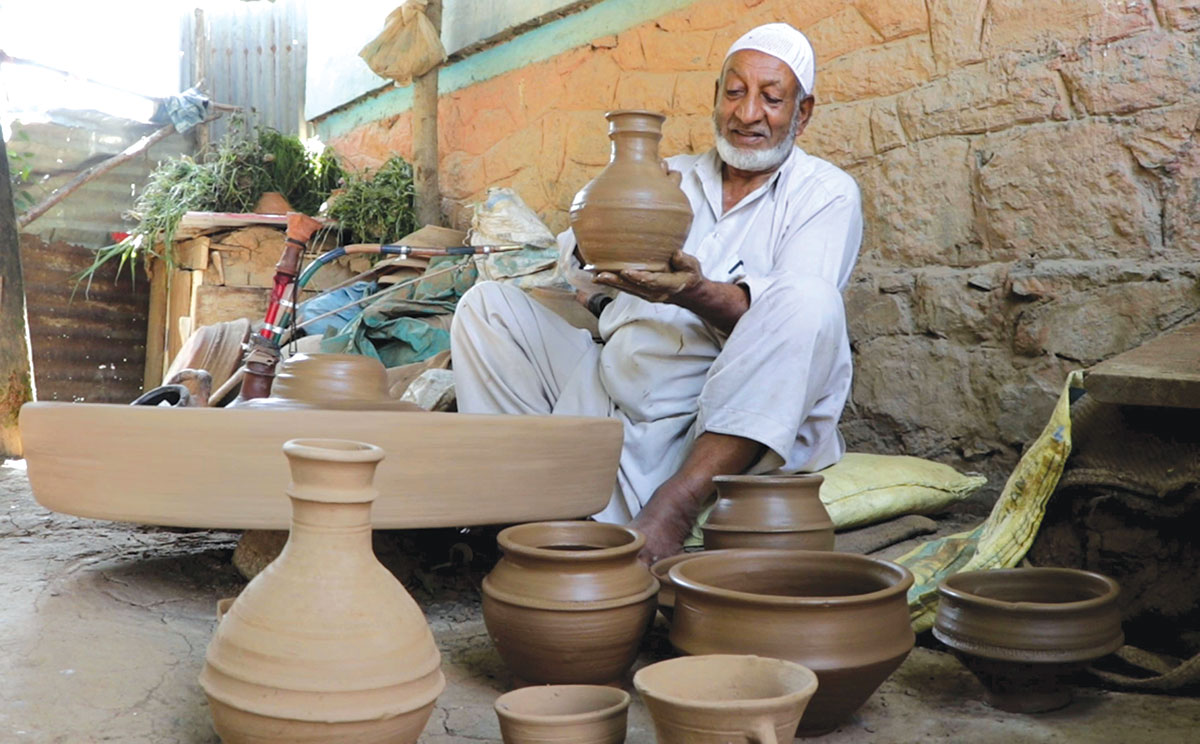Contrary to public belief and researcher’s verdicts, the pottery in Kashmir is not dead, reports Bilal Bahadur

There were 22 families in Wakoora, a Ganderbal village who were professional potters for the last more than two centuries. As people started using the steel, aluminium and plastics, the market appetite for the earthenware nosedived heavily. In 2019, there are only three families who are still in pottery. They are marginal farmers also.
“I have been into pottery for 55 years,” Mohammad Subhan Kumar said. “I rarely sit idle. I work and I am happy that the earthenware is still not out of fashion as some people believe.” He said he works almost all days and never confronted a crisis.
Subhan has been to Haj pilgrimage once. The lack of demand has not impacted his routine either. He drives to Dargah Hazratbal for last 56 years and ensures he prays there regardless of a strike, or a curfew.
“There is less demand for certain items as they are no more in vogue. People have found better alternatives to some of the items we made,” Kumhar said. “But there are certain items that are in huge demand – Tumbaknari, Jajeer, Tandoor and Tchelum. In fact, the Koundal is in huge demand and the most profitable item that we produce.”
Koundal is the key product because it involves fewer costs in making and does not require any paint or varnish before it goes to the market. “We do sell Tumbakhnari for Rs 150 a piece but it involves a lot of effort,” Kumhar said. “We have to get skins from ZainaKadal and fix the skin. In the case of Koundal, we have to do nothing – we make it, put it in the kiln, bring it out and supply.” Koundal is the main ingredient of the Kashmir’s celebrated fire pot, the Kangri. Endemic to Kashmir, Tumbaknari is a musical instrument that women use during celebrations at home, especially on marriages.
Subhan remembers the days when they used to be in the business of barter. The potters would supply the requirement of earthenware to the families in their village and they would pay in kind at the time of harvest. “Every potter family usually would get a kharwar each from every client and that would make us happy,” Subhan said. They would hawk their products from door to door in the village to people who were not their regular clients. Kharwar is 80 kilograms.
Now the situation has changed. “Buyers come to us, pick their items from our store, pay the costs and take their purchase in mini-trucks,” Subhan said. “I am happy that this is happening.”
Unlike Subhan, his relative Ghulam Mohammad Kumharowns an electric wheel that government has distributed free among the professional potters. “This has made a big difference,” Ghulam said. “It has become far easier to work because of this electrical wheel.”
In a season, Ghulam Mohammad is selling almost 30,000 earthen lamps. Once a basic requirement of every family in Kashmir, these lamps are in huge demand because they are being used in the temples during the prayers. The demand surges on special occasions like Diwali.
Ghulam Mohammad seconds Subhan in revealing that the Kashmiri Pandits are hugely seeking earthenware from Kashmir. It includes the lamps for prayers and the huge earthen containers for storing water. Earthen material cools the water and works as a natural refrigerator and that is the key reason why it is in demand. “I had a demand for almost one lakh pieces of these lamps this season, but I could not deliver this order within a few days,” Subhan said.
Subhan and his neighbours insist that they have rarely stopped working because they have never felt a lack of demand. In certain cases, the demand nosedived, but in a number of items, it actually surged, thus keeping the potters busy for most of the year.
However, they are facing a peculiar problem – the non-availability of perfect soil. “You must know that in pottery the soil that carries any foreign material including sand is leading to bad manufacture,” Subhan said. “We have to have perfect soil and that costs hugely.”

Wakoora potters are getting truckloads of “perfect soil” from remote north Kashmir and it costs almost Rs 20,000 for a tractor-trolley load. Ghulam Nabi, another potter of last 40 years said he had to stop working for almost two months as he was unable to manage the perfect raw material. Finally, he said, it was an orchard soil from Tangmarg that somehow managed for the season.
These three families insist that they have never thought of giving it up. The next generation of these families sees the pottery as a second profession that would help them manage their lives better. They are not close to improvements in design and products if and when they get a better idea.
(The copy is based on a short film that Bahadur recorded in the village)













